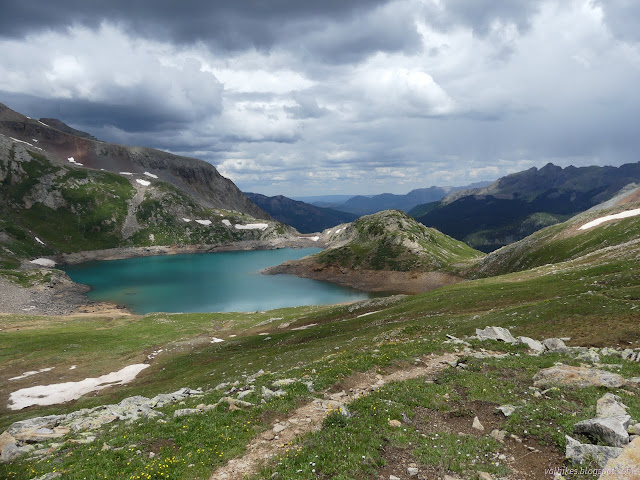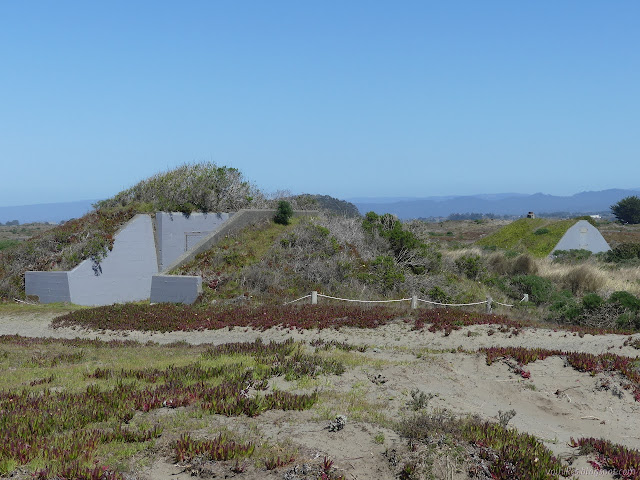Cone Peaks: Brown Mountain
Inyo National Forest
DAY 1 | DAY 2 | DAY 3 | DAY 4
With the wet ground and falling temperatures in the night, there was a fair bit of dew. As the sky brightens, a moo drifts across the grass. Ah, wildlife. The mist hangs over the meadows, especially around the river, but it increases and moves as the sun rises and warms the wet ground. I thought I was well situated to get some morning rays, but it just takes forever to get over the mountains.

Eventually, I realize the sun actually is glowing up there in the sky, however what was a sky full of stars has somehow turned into a sky full of clouds. There is no telling how long it will take the sun to come out, so everything will just have to be put away wet. Since I ignored the road to find water and then camp last night, I have to go find it again in the morning. This is easy, it is right where I left it. Then I have to try to navigate the many junctions to the trail through Hessian Meadows that I want to head north on. This is a little more difficult. This is harder since I seem to have oriented myself a bit away from the true directions. Deep down I must really want to climb Olancha rather than little Brown Mountain and I keep trying to go too far east. It might help if the signs made any sense. They just say "dead end" when they are not just pointing out what is another 100 feet along.

I cross the South Fork Kern River barefoot in the sandy ford. It is not particularly cold and the sand is smooth. Now I am spared the confusing signs by having no signs at all except a couple showing the designation. Harrison does not thing road or trail designations are important, so none of these are helpful in fixing my incorrect orientation. I pick one and it slowly curves away from where I am going, so I yield and return. Another try gets me past a spring, which would be nice if not for the big cow turd in the middle of the pool, to some cabins and a trail. It is not the one I want. I try again getting to Monache Creek, which has some very lovely water coming down it, and a couple more trails. Mime is the one on the left past an unexpected administrative site.



It took me five miles to get out of the meadow. That is way too much, considering. The administrative site threatens to make me question where I am again since there is supposed to be a ranger station further south. I keep to the trail as it rounds onto the edge of a meadow. The sun has finally come out and it is getting a bit warm as I start to get to play beneath the trees. The climb is gradual and does not increase much as the dry meadow turns to dry creek under the trees. There is a location poster with a less familiar design along the way. Unfortunately, the corner with the bearing is torn off and I cannot see a number for the distance. All I can tell is it was placed in 1928. Looking to the fallen tree on one side and across the dirt gully on the other, there is nothing to see. It is not so close and obvious. Just a distraction.


A wooden sign nailed to a tree marks the wilderness boundary at the top of the climb. This is where I will start my off trail explorations for the day. Off to the east should be an old benchmark and off to the west is a named peak. I can leave some supplies here, but the sky has some threat to it so I only drop the bear canister. The threat is not so great as it was the day before, but it is still there. I turn east for the shorter of the two excursions. The underbrush makes some routes undesirable, but there is not much to worry about. I climb up to a nice rock outcrop that looks promising, but there is nothing up there but a bit of view.


Unfortunately, the rock holds no treasure. I do not think I have climbed quite high enough, so go looking for some more up. It is not forthcoming. There is some gradual climb, but then it goes down again, slowly increasing. This does seem to be the top before some significant ups to places that are too high. I check the map over and over, but this has to be the right place. I walk back, now investigating ever rock outcrop on the way, but nothing has anything to give me. I am back to the original outcrop as a little rain starts and distant thunder rolls. There is one last rock past it to check, but then I am out of options. There does not seem to be anything I can recognize as a benchmark.

Disappointed, there is nothing to do by return to the saddle. My water is lower than I would like, but still enough, so I head up the other side for Brown Mountain. The rain falls lightly and the thunder rolls distantly. It does not seem like something to worry about on this wooded slope. Also, it looks like I am at the edge and it will not stay around much. So I climb. There is a bit more vegetation to worry about on this one, but not enough to cause real trouble to going ever upward.


The slope levels out again and at first, it looks like the top will indeed be very boring. As it levels further, though, a rock outcrop can be seen to the south. That is clearly the high point of the peak, so I complete my climb on it.


Behind the summit block, a little shorter, is another rock outcrop with an even better view. One day I will remember to look for a register, but for today, I just take in the view. The rain has indeed passed.



After a bit, I head down again and collect my bear canister. Now all I want to do is continue north and find a camping spot somewhere near the foot of Templeton Mountain. Oh, and get some water. There is supposed to be a cow camp along the trail up ahead with a spring nearby. That should be a good place to get water.


The trail follows old fencing up into the trees away from lush Brown Meadow below. There is quite a lot of old fencing, all knocked down now. Eventually, I spot a few buildings and a little reservoir for the spring water. Checking the reservoir, it is dry except where the leaves inside have been moistened by the rain. It was once covered, but the lid to the side has become twisted now. This is not the spring box, but looking around shows no tell-tale patches of green to show where that might be. It looks like it might have run dry. I go to look at the buildings instead. This was once an official outpost for the Forest Service and included a single line telephone for communication. The line still hangs in the trees for a little way and connects to a one cabin through a bulky rig. The buildings have all had doors and locks compromised in the past and now have more extensive barriers to keep out the opportunistic or desperate.


The trail comes close to the stream below the camp, so I grab water from there. Once in a while, I think I can hear a cow, but I cannot see any. The evidence of their long presence is certainly all around. As Brown Meadow turns to Strawberry Meadows, the view opens up. The trail curves around high on the side of the meadow as the sun starts to come out again. Ahead, there is a sort of scar on the land and then the trail suddenly drops down into the shallow granite gorge of the South Fork Kern River. There is no bridge, but some rocks and a log provide a way across the oversized creek.



The gorge of the Wild and Scenic River, as declared by Congress, is crossed and climbed out of almost as quickly as the drop in. I am back to sages and flowers in the drying Strawberry Meadows ringed by high and low mountains.



I continue on along the trail. It gets further down into the meadow and harder to follow. As I lose it, I decide it might be time to go for a campsite anyway. Another 15 miles and a bit more have passed below my feet and it is getting late. A bit of trees above look promising, so I make my way there. There is a flat spot without too much cow turd. Maybe. The cow pies are everywhere. The only place to set up my stove is on a soggy log, but as I try, it really will not work. Looking around for a nice, flat stone, there seem to be no stones anywhere in the area. Then I spot it, three quarters of a fire ring made up almost entirely of nice, flat stones. It is in a small clearing and the cow pies there have dissolved in the rain. It seems a better spot, so I move the short distance.

It is a little colder up here in these meadows which are about 500 feet higher. I decide to deploy the bivy against the wet that may come one, although it should be a little less when tucked a little way into the trees.
Continue reading: day 3
The associated album is here.
©2016 Valerie Norton
Posted 5 July 2016
Liked this? Interesting? Click the three bars at the top left for the menu to read more or subscribe!




Comments